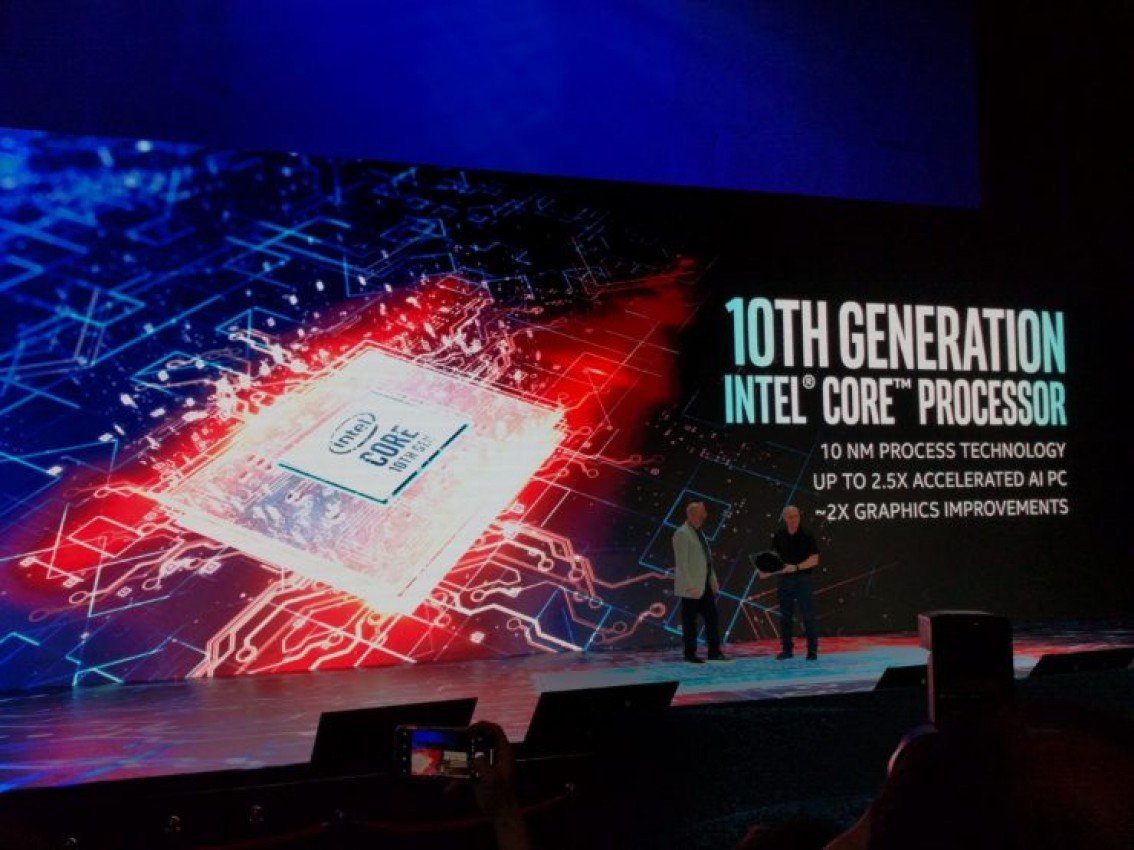 Intel finally revealed "Ice Lake" at Computex 2019. (Image via: Wccftech)
Intel finally revealed "Ice Lake" at Computex 2019. (Image via: Wccftech)
Intel Unveils Its 10th Generation
TAIPEI - Intel broke the silence about the next cores for the future. After a series of unfortunate events, Intel came back to the game.
At Computex 2019 in Taipei, while being dominated by revolutionary revelations by nVidia, AMD, Qualcomm, and many more including start-ups, Intel finally walked out with applause and cheers from the audience by the announcement of the end of era for “Whiskey Lake”, by revealing the full detail of “Project Athena” which now has its own code-name, “Ice Lake”.
Everybody had already had a sneak peek of Intel’s “Project Athena” in January 2019 at CES. “Project Athena” emphasized on these points: Focus, Always Ready, and Adaptive. It teased 10nm, and 9 cores processor, something that it has been trying to do since last years, before Intel was blown away by the departure of its CEO, Brian Krzanich, in June 2018.
The three messages that struck the issue on performance, battery life, and connectivity. However, is it true that Intel’s 11th generation covers all of this? Let’s find out.
By entering Ice Lake, Intel at last abandoned the 14nm transistors and entered 10nm. The “Ice Lake” generation uses new revolutionary technologies such as WiFI 6 GIG, Thunderbolt 3 (for faster connectivity) and of course optimization in graphic processing which means smoother and 1080p resolution, even 4K 60 fps video is included in the specifications.
For the performance, Intel answered our prayer by implementing Dynamic Tuning 2.0 equipped with Machine Learning for your computer. Machine Learning deals with predicting the workload for your computer, thus optimize your computer’s thermal budget power so it will not overload.
Nonetheless, the world has to wait for its implementation in PC, since the “Ice Lake” will be implemented first within new generations of laptops. Audience could not blame Intel, since Intel already said in the beginning of “Project Athena” that it would deal with laptops first.
Moreover, Intel has so much to catch up since their last update. While the audience was wowed by all the speedy data, turns out Intel was comparing the data with “Sky Lake”. For your record, “Sky Lake” was released almost 4 years ago!
In terms of clocking performance, indeed, “Ice Lake” is much faster than “Sky Lake” but by a near margin. Near margin seems to be insufficient for 4 years of development, since the market craves for more innovation.
In the other news, gamers can rejoice, since Intel finally released the i9 processor for gaming. With the announcement of 10th generation cores and i9, the future of e-sports seems bright. In addition, Intel added that this fall, the audience could expect new Intel Core X series.
 English
English Japan
Japan

modafinil doesn't work buy modafinil provigil provigil withdrawal symptoms a comprehensive view what level is modafinil
cialis 5mg vs 20mg extenze reviews how long sildenafil last roman viagra best coupon rebate app viagra for women over 50 best energy booster
neurontin headaches neurontin price south africa where can i buy neurontin online how to use gabapentin for opiate withdrawal
zithromax 500mg price zithromax online prescription can i get azithromycin over the counter how long does it take azithromycin to work
extenze reviews once daily cialis buy viagra online viagra gold 800 tadalafil generic best prices cialis price comparison walmart viagra side effects female libido natural remedies how to make viagra work hims viagra how many mg is viagra viagra information by mail i need cialis overnight delivery cialis half life chart over the counter viagra difference between sildenafil and viagra female pink viagra side effects accessrx viagra viagra alternative herbal viagra pills can you take viagra daily walgreen cialis prices without insurance online canadian prescription drugs viagra boys what is tamsulosin used to treat products not approved by fda manufacturer of viagra in us best energy supplement for fatigue roman viagra pharmacies that accept medicare assignment belviq not working viagra jelly reviews for men libido pills for women pfizer viagra list of mexican medications viagra cvs pharmacy
neurontin hydrocodone neurontin 600 mg every 6 hours what are the side effects of gabapentin 300mg
furosemide potassium furosemide 40 mg without prescription what is lasix for horses what is the effect of administering a diuretic, such as furosemide?
dapoxetine ebay get a dapoxetine prescription online how long does it take for dapoxetine to work
amoxicillin 500 dosage purchase amoxicillin 250mg uk amoxicillin and warfarin cephalexin and amoxicillin
prednisone to methylprednisolone prednisone eye drops side effects what is prednisone tablets used for
zithromax for strep zithromax rx how long does azithromycin last how much azithromycin to treat chlamydia
cialis pills coupon price of viagra 100 mg i need viagra overnight delivery cialis viagra sildenafil 100mg price does cvs accept goodrx red pill for impotence
ivermectin humans ivermectin 0.2mg ivermectin for tapeworms in humans how much ivermectin pour on for 900 lbs cow
lasix action furosemide 40 common side effects of furosemide how does furosemide cause hyperkalemia
amoxicillin directions amoxicillin where to get can you buy amoxil over counter amoxicillin for sale
prescription drugs online without doctor hernandez settlement viagra after prostate surgery viagra cock vitamin for libido in women side effects of valium diazepam cialis from usa pharmacy
injectable ivermectin ivermectin 0.5% brand name ivermectin pills over the counter how much horse paste ivermectin do you take orally for headlice
drug neurontin price of neurontin what is neurontin 100mg used for how long for gabapentin to work for nerve pain